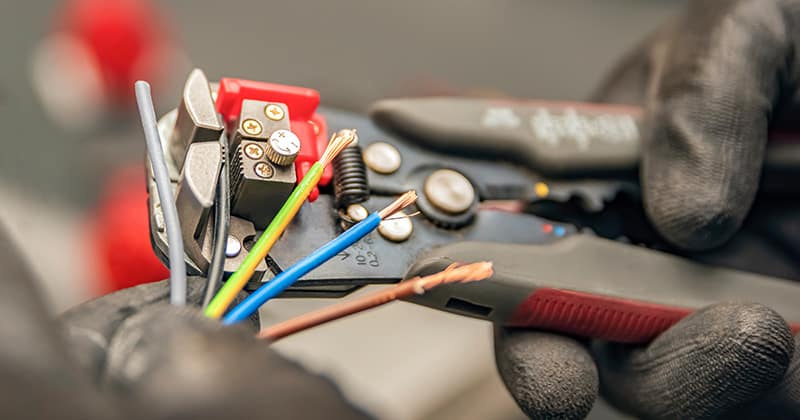4 Reasons Why Electricians Need Liability Insurance
Electrical contractors are in a high-risk industry. While you can’t avoid things like property damage from a faulty wire or accidents, you avoid problems with an electrician liability insurance policy.

Staff Contributor
Working with electrical systems is a risky business. There’s always the chance that something could go wrong on the job site and damage your client’s property. With live wires, active circuits, and other electrical dangers, you also have to think about injury risk.
As an electrical contractor or self-employed electrician, you can’t fully eliminate risk. But you can protect your business with electrician liability insurance.
Liability coverage enables you to operate with peace of mind. It’s also essential for attracting clients and being successful.
Because liability insurance is so important, think twice before agreeing to a job without it. Even if you’re a new business, you still need liability insurance.
In this article, we reveal why electricians need liability insurance. We’ll also look at the different types available and how much it will cost to protect your electrical contractor business.
What Is Liability Insurance, and Why Do Electricians Need It?

Liability insurance protects your business from property damage, bodily injury, or errors and omissions claims. Without it, you have to pay legal fees and court costs. If you lose the claim, you could also lose the compensation award.
Your business might also be on the hook for medical expenses, repairs, or other losses.
Depending on your company’s financial situation, a single claim could be enough to sink your business. Here’s an example of what that doomsday scenario might look like:
Your employee knocks over a piece of expensive artwork while installing a subpanel. The frame cracks, and the artwork is ruined.
Your client can file a claim against you for their damaged property. If the artwork is worth thousands of dollars, guess how much your business might lose?
The reality is that accidents, injuries, and mistakes aren’t uncommon. A survey of 1,000 small business owners revealed that three out of four experienced an insurable event in 2020. And over a quarter of those events would have been covered by professional liability insurance.
As an electrical contractor, you need electrical insurance to avoid these financial risks. It’s also a must-have for staying operational. Whether you’re dealing with lighting installation, high-voltage projects, or fiber optics, you can’t risk a liability claim. The financial risk is too high.
4 Benefits of Having Liability Insurance for Your Business

Electrician liability insurance is a key factor in long-term success. It protects your business against risk, but it also offers other benefits. Here are four of them:
1. Protection Against Third-Party Legal Claims
This type of business insurance protects against claims made by a customer, passerby, or another third party. If an accident does happen, you won’t have to pay legal fees or compensation.
Pro tip for electricians with employees: you still need workers’ compensation insurance in case a worker is injured on the job.
Consider these scenarios and what you would do if you weren’t insured:
- You buy $5,000 worth of copper wiring for a commercial client and bring it to a job in your work truck. But you leave your work truck unlocked. A thief steals the materials you bought for your client’s electrical project, and you’ll have to replace the lost property out of your own pocket.
- Your company takes on a big job to install new overhead electrical lines. As part of the project, you hire a subcontractor to put in the new utility poles. The subcontractor hits a sewer line, causing spillage into a nearby stream. Your business is responsible for the $120,000 in sewage cleanup costs.
- Your team installs a new security system in an office building, but an employee cracks a glass door in the lobby while carrying in equipment. It will cost $3,500 to fix the glass.
In all these situations, your business would have to pay thousands in damages. That’s not what you expected when you decided to offer electrical services. But it’s what can happen if you’re not properly insured.
Even when you or your employees aren’t at fault, someone can still sue your business. That means you could face legal fees, reputational damage, and stress no matter what you do. But with liability insurance coverage, you’re insulated from legal fees. You also avoid the costs associated with property damage or bodily injury.
2. Easier Time Getting Clients
General liability coverage isn’t just good for your business. It’s good for your clients too.
When your business is insured, your clients get peace of mind. When they hire you to install a new electrical system or perform a repair, any resulting damage is covered.
Be sure to let your potential clients know you are insured on your website and other promotional materials. This transparency could be the deciding factor that gets you the job instead of a competitor!
3. A Fail-Safe In Case of a Faulty Workmanship
With professional liability insurance for electricians, you’re also covered in case of faulty workmanship.
Here’s an example: Let’s say you install a new smart electrical system in a client’s home. However, a few months down the road, the client complains that the system is not working correctly. You go in and fix the mistakes. But your client still has issues and hires another electrician to fix them. Then, the client sues you for their costs.
In this claims scenario, your losses include all the time and labor spent on your client’s project. You’ll also pay legal fees and the cost of the new work if you lose in court—unless you have the right electrical contractor insurance.
4. Coverage for Advertising Injuries
Another benefit of liability insurance is protection from advertising injuries. If your advertising—whether it’s ad copy on your website, a slogan, or messaging in a marketing email—includes wording that harms another business, that business could file a lawsuit.
Say your advertising makes a competitor appear unprofessional, which causes them to lose business. Or maybe your marketing team uses another company’s slogan in your advertising material without your knowledge. Anytime there’s an offense, your business is at risk of a lawsuit.
With a general liability insurance policy, however, your business is protected against all types of advertising injury claims.
The Different Types of Liability Insurance Available to Electricians

Most businesses choose general liability insurance. Also known as business liability or commercial liability insurance, this type of coverage is important for most third-party claims. But there are other types of liability insurance you might want to purchase.
Here’s a breakdown of the different types of liability insurance available to electricians and what they cover.
General Liability Insurance
General liability is probably the most vital business insurance for electrical contractors and electricians. It covers the following:
- Bodily injuries (for non-employees)
- Property damage
- Reputational harm
- Advertising injuries
- Damage to premises rented to your business
Your insurance policy will help you pay for medical expenses, property repair, legal fees, and settlement bonds or judgments if a claim is made against your business.
Professional Liability Insurance
While you might do an impeccable job, there’s no guarantee you or your employees won’t make a mistake at some point. Especially in difficult or complex jobs that involve older buildings, mistakes happen.
Professional liability shields your business from faulty workmanship claims. It’s also known as errors and omissions or E&O. It’s an important risk-reduction tool for professional services, such as accounting, law, plumbing, and electrical work.
This type of liability insurance protects you if you cause someone to lose money because of a mistake or negligence. It’s not something you’d buy instead of general liability insurance.
You can add professional liability to your existing business insurance policy.
Umbrella Liability Insurance
Depending on the type of clients you work with and the size of your business, you might prefer an umbrella policy.
Think of umbrella liability insurance as a backup plan in case disaster strikes twice or in a big way. It covers the gap between your general liability policy’s limits and what your business might owe. For example, as a small business owner, you might purchase electrician liability coverage with a limit of $500,000.
That means your insurance company will pay up to $500,000. But what if you have multiple claims against your company or a very large claim and your company owes more than that amount?
If you have umbrella liability insurance, your policy will kick in and cover the gap.
How to Get Liability Insurance for Your Business
You can purchase liability insurance from a licensed commercial insurance agent or by contacting an insurance provider directly. Before buying business insurance, you should do a little homework.
The Small Business Administration recommends taking the following steps before buying insurance:
- Determine what risks your business has. As an electrical contractor business, you will have a different set of risks than a coffee shop or a landscaping company. Because accidents or negligence can cause substantial harm—for example, faulty wiring could lead to a fire or a live wire on a job site could cause serious injury—you want to make sure you have adequate liability coverage.
- Talk to a licensed agent. There are a lot of insurance companies you can choose from, and it might not be easy to figure out which policies are best for your needs. That’s where working with a commercial insurance agent can be helpful. They do receive a commission for selling policies, so make sure you work with a licensed agent who genuinely wants to help your business. But talking to an experienced professional can narrow down your search.
- Compare policies. The cost of electrical contractor insurance will vary depending on how much protection you want to buy and the policy (or policies) you choose. Be sure to take the time to compare rates and benefits from different insurance offers.
- Revaluate your policy annually. You might need more protection as your business grows. On the other hand, you might decide you have more coverage than you need. With a yearly assessment, you can make sure you have what you need but aren’t overpaying.
How Much Does Liability Insurance Cost?

The cost of electrical contractor insurance depends on your policy limit, your deductible, and whether you decide to purchase general liability as a standalone policy or bundle it in a business owner’s policy with commercial property insurance.
According to Insureon, electrical contractors pay about $45 per month for their general liability insurance premium. Professional liability insurance is a little more expensive. Electricians pay a median price of $90 a month for E&O. If you decide to bundle your liability insurance, you could pay less.
Get the Protection Your Business Needs
Because electrician liability insurance dramatically reduces the risk of doing business, it’s a good idea to have a policy. Once you have coverage, you can take on the jobs you want worry-free.
Here’s what you can do today to get the ball rolling:
- Make a list of five to ten electrician insurance providers.
- Narrow down your top ten by comparing benefits and reading reviews online.
- Request a quote from your top three.
Kevin is an experienced content expert with experience in marketing strategy, creative writing, video production, social media, and team training. Additionally, he also has a master's degree focused in Playwriting from Texas State University.

Business Solutions For Field Service Pros
EverPro offers specialized solutions designed for home and field service professionals. We’ve got the business tools to help you get the job done.



